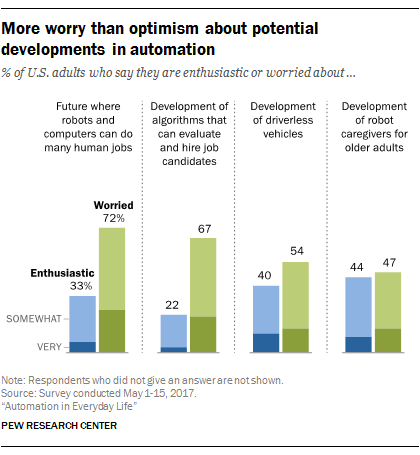Career Anxiety Among Market Research Professionals
Article by Kathryn Korostoff
Do market research & insights professionals experience career anxiety?
Of course.
As do professionals from many fields—especially those that are being affected by technology.
Career Anxiety Due to Technology is Widespread
A May 2017 Pew study showed that 72% of Americans worry about job loss to technology. Posed as, “a future in which robots and computers are capable of doing many jobs that are currently done by humans,” this can cover everything from people concerned about factory automation to those concerned about white collar job automation. Like ours.
Another study on technology-related career anxiety suggests that while technology advances may create new opportunities, they may also reduce the need for certain kinds of workers. In this 2018 survey of 521 knowledge workers conducted by B2B research firm Clutch, almost half report working for organizations that have hired “technically skilled” workers in the preceding year. One in ten report working for companies that laid employees off in the preceding year due to technology. While 85% participants also report positive attitudes about learning new technical skills, watching technically skilled people get hired while others get let go is still an understandable source of anxiety.
Is Technology Disrupting Market Research-Related Career Paths?
Does this apply to our profession? Yes. But technology is just the “how.” Technology itself is not “why” our profession’s career paths are changing. The real why is the dominance of data-driven decision making. Thus, if you want to mitigate career path risks, focusing solely on technology is shortsighted.
The Pursuit of Data-Driven Decision Making is Driving New Career Scenarios
Data-driven decision making is nothing new. Go back to the 1960s for Drucker’s focus on data, and his oft-cited, “What gets measured gets managed.” Of course, today we can do it at a scale never-before-seen. And that is thanks to technology.
The embrace of data-driven decision-making means business leaders in various functional areas are more data fluent than ever. They value multiple data sources, and are agnostic about data sources—they just want the best data for any given job. And these days, that means considering dozens of data types and hundreds of sources. Long gone are the days when companies seeking customer insights had to rely on self-reported data. The widespread availability, breadth and depth of various 1st, 2nd and 3rd party data sources is amazing.
Technology is Making Data-Driven Decision Making Faster & Better Than Ever Before
Market research & insights professionals experiencing career anxiety need to avoid the trap of focusing on technology alone. Sure, learning about automation, AI and cool new tools is great. But if you want to future-proof your career, you need to figure out how to leverage those things to support clients who are specifically seeking best-in-class data-driven decision making. Businesses need trusted advisors who can bridge the gaps between data and decision making, as described by McKinsey in the Harvard Business Review.
How Can Market Research & Insights Pros Combat Career Anxiety?
To conquer career anxiety, we need to update our career plans for a world where A) data-driven decision making is a top C-suite priority and B) technical skills (various kinds) are highly valued.
The professional who adds value to the data-driven decision-making universe is likely to have positive career momentum. Adding on technical skills as part of this value, and you’ve amped up your momentum even more.
Does change beget anxiety? Yes. But remember:
“It is not the strongest or the most intelligent who will survive but those who can best manage change.” –Charles Darwin













